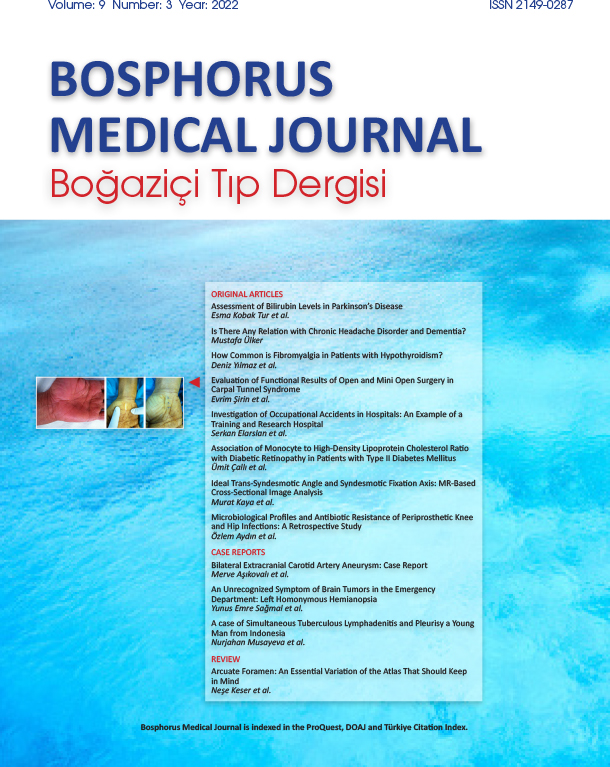Akut Apandisitte Klinik Değerlendirme ve Çift Kontrastlı Bilgisayarlı Tomografi ile Ön Tanı
Yılmaz Aydın1, Ahmet Doğan Kuday2, Verda Tunaligil1, Derya Abuşka3, Mustafa Yazıcıoğlu4, Doğaç Niyazi Özüçelik51Acil Sağlık Hizmetleri Başkanlığı, İstanbul Sağlık Müdürlüğü, Türkiye Cumhuriyeti Sağlık Bakanlığı (T.C. SB), İstanbul, Türkiye2Sağlık Bilimleri Üniversitesi, Hamidiye Sağlık Bilimleri Enstitüsü, Afet Tıbbı Anabilim Dalı, İstanbul, Türkiye
3T.C. Sağlık Bakanlığı Sağlık Bilimleri Üniversitesi, İstanbul Eğitim ve Araştırma Hastanesi, Acil Tıp Anabilim Dalı, İstanbul, Türkiye
4Yeditepe Üniversitesi, Acil Tıp Anabilim Dalı, İstanbul, Türkiye
5İstanbul Üniversitesi Sağlık Bilimleri Fakültesi, Acil Tıp Anabilim Dalı - Cerrahpaşa, İstanbul, Türkiye
GİRİŞ ve AMAÇ: Bu çalışmanın amacı, histopatolojik tanıya göre akut apandisit ön tanısı olan ve çift kontrastlı abdominal bilgisayarlı tomografi (BT) sonrası opere edilen hastalarda abdominal BTnin tanısal değerini ortaya koymaktır.
YÖNTEM ve GEREÇLER: Bakırköy Dr. Sadi Konuk Eğitim ve Araştırma Hastanesinde, 01 Mart 2009-01 Mart 2011 tarihleri arasında, acil tıp polikliniğine karın ağrısı şikayetiyle başvuran ve klinik olarak akut apandisit tanısı ile ameliyat edilen hastaların verileri gözden geçirildi. Olgu grubu, ameliyat öncesi çift kontrastlı karın BT taraması yapılan 111 hastadan oluşuyordu; kontrol grubu ise abdominal BT taraması yapılmadan opere edilen rastgele seçilmiş 50 hastadan oluşuyordu.
BULGULAR: Bu çalışmada hastaların %57,1'i erkek, %42,9'u kadın ve hastaların yaş ortalaması 38,90±16,38 yıl idi. Gruplar arasında cinsiyet, yaş, semptomlar, vücut ısısı, abdominal fizik muayene, beyaz küre, tam idrar tahlili sonuçları ve Alvarado skoru açısından anlamlı fark yoktu (p>0,05). Histopatolojik olarak apandisit tanısı alan hastalarda, almayanlara göre ultrasonografi (USG) ve BT arasındaki tanı farkı istatistiksel olarak anlamlı bulundu. Akut apandisit tanısında USG'nin duyarlılığı %35,71, özgüllüğü %85,71, pozitif prediktif değeri (PPV) %90 ve negatif prediktif değeri (NPV) %27,02 iken, BTnin duyarlılığı %60,46, özgüllüğü %92, PPV değeri %92,85 ve NPV değeri %40,35 bulundu.
TARTIŞMA ve SONUÇ: BT, acil serviste akut apandisit tanısında kullanılabilecek temel yöntemlerden biridir ve gereksiz laparotomiyi azaltabilir. Acil serviste klinik muayene ve USG ile akut apandisit tanısı konulabilmektedir, ancak USG ile akut apandisit tanısı konulamayan hastalarda BT değeri daha yüksek bulunmuştur.
Prediagnostic Clinical Evaluations and Double Contrast Computed Tomography in Suspected Acute Appendicitis
Yılmaz Aydın1, Ahmet Doğan Kuday2, Verda Tunaligil1, Derya Abuşka3, Mustafa Yazıcıoğlu4, Doğaç Niyazi Özüçelik51Presidency of Emergency Medical Services, Health Directorate of Istanbul, Republic of Turkey Ministry of Health (TR MoH), Istanbul, Türkiye2Department of Disaster Medicine, Institute of Hamidiye Health Sciences, University of Health Sciences, Istanbul, Türkiye
3Department of Emergency Medicine, TR MoH University of Health Sciences, Istanbul Research and Training Hospital, Istanbul, Türkiye
4Department of Emergency Medicine, Yeditepe University, Istanbul, Türkiye
5Department of Emergency Medicine, Faculty of Health Sciences, Istanbul University - Cerrahpasa, Istanbul, Türkiye
INTRODUCTION: The aim of this study is to reveal the diagnostic value of abdominal computed tomography (CT) in patients with suspected acute appendicitis according to their histopathological diagnosis and who were operated on after double contrast abdominal CT.
METHODS: The data of patients who were admitted to Bakirkoy Dr. Sadi Konuk Research and Training Hospital Emergency Medicine Clinic between March 01, 2009, and March 01, 2011, due to abdominal pain and were operated on with a clinical diagnosis of the acute appendicitis have been reviewed. The case group consisted of 111 patients who underwent preoperative double-contrast abdominal CT scans; the control group consisted of 50 randomly selected patients who were operated on without abdominal CT scans.
RESULTS: In this study, 57.1% of patients were male, 42.9% of patients were female, and the mean age of patients was 38.90±16.38 years. There was no significant difference between the groups in terms of gender, age, symptoms, body temperature, abdominal physical examination, white blood cells, complete urinalysis results, or Alvarado score (p>0.05). The diagnostic difference between ultrasonography (USG) and CT was found to be statistically significant in patients who were histopathologically diagnosed with appendicitis compared to those who did not. While the sensitivity of USG was 35.71%, specificity 85.71%, positive predictive value (PPV) 90%, and negative predictive value (NPV) 27.02%, the sensitivity of CT was 60.46%, specificity 92%, PPV 92.85%, and NPV 40.35% was found in the diagnosis of acute appendicitis.
DISCUSSION AND CONCLUSION: CT is one of the essential methods that can be used in the diagnosis of acute appendicitis in the emergency department and it can reduce unnecessary laparotomies. Acute appendicitis can be diagnosed by clinical examination and USG in the emergency department, but the value of CT was higher in patients who could not be diagnosed with acute appendicitis by USG.
Makale Dili: İngilizce




















